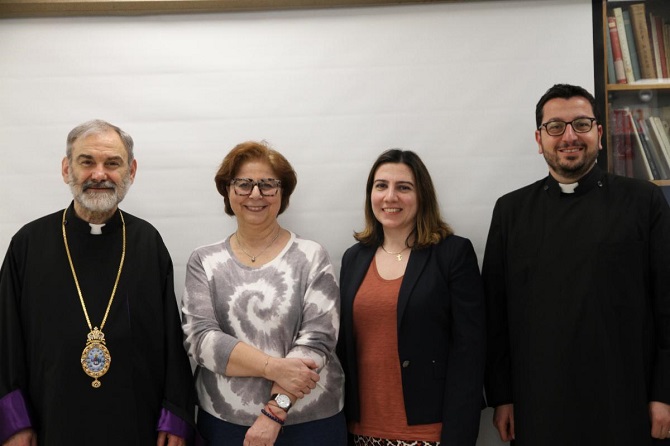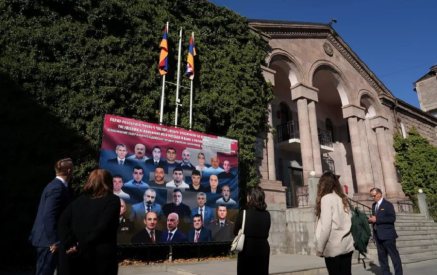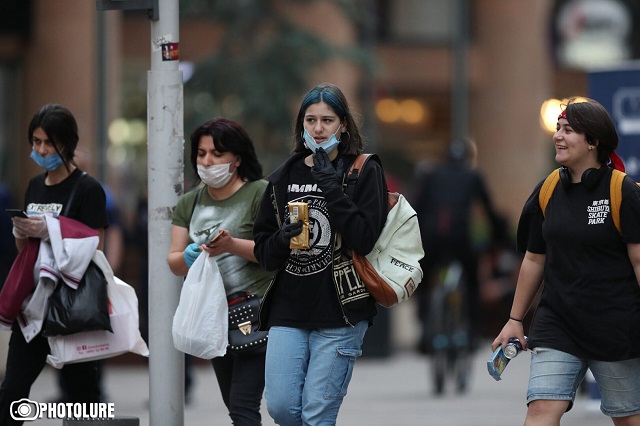The Armenian Weekly. The leadership crisis in our church has been one of several themes in this column. Our community cannot thrive without the largest and perhaps most important institution firing on all cylinders. This column tries to advocate for vision, reform and action to keep the diaspora and Armenia thriving. It is also about acknowledging and encouraging positive efforts that hopefully will inspire our community. If we are going to engage in good faith criticism to bring issues and ideas in the mainstream, then we should be equally prepared to compliment actions and events that put our communities and institutions in a better position to be credible. It is credibility that enables leaders to have followers. In the past week, two events took place, both emanating from the New York area, with possible far-reaching implications beyond face value.
On March 1, St. Sarkis Armenian Apostolic Church parish of Douglaston, NY sponsored a talk by Maro Matosian on domestic violence. St. Sarkis is a parish affiliated with the Eastern Prelacy that primarily serves the Armenians of Queens and Long Island. Maro is a longtime activist and founder of the Women’s Support Center (WSC) in Armenia. This is an outstanding organization that provides victims of domestic violence and their children with hope through shelter, counseling and support to rebuild their lives. They have literally saved the lives of many women who previously had no options except to suffer the risks and indignity of abuse. Maro and her colleagues have been vocal and resilient advocates for years to bring this stain on our society into the mainstream. In a patriarchal society, this tragedy is the burden of the victim. With options such as the WSC and improvement in public discourse, these women are slowly developing the ability to stand up to this criminal behavior.
As we have mentioned in this column, the church in Armenia has been strangely silent on this matter. Not that the church has been vocal on other social problems, but when the lives of the faithful are at risk, one would assume the church would stand up. Unfortunately, this has not been the case. Is it possible that an extreme hierarchical and patriarchal institution is out of touch with an important segment of its flock? In the past, when the political environment in Armenia ignored this problem, it was perceived that the church was aligned with that administration. Since the Velvet Revolution, the government has been openly supportive of these and other issues and has defined them as critical to improving the quality of life for all citizens of Armenia. So, again…why has the church in Armenia remained silent?
This is why the event at St. Sarkis was so refreshing. Perhaps a Prelacy church feels less “constraint” given its jurisdictional relationship, or perhaps it is just because of the good people at St. Sarkis that this event was scheduled. The Prelate, Archbishop Anoushavan Tanielian, was in attendance and a visible presence. As many of you are aware, our church works with a code of protocol. The presence of the diocesan bishop is usually a conscious arrangement. It is not a random act. I am hopeful that his participation signals a more active role for the church in general, and his parishes in particular, in raising awareness and advocating for an end to violence.
Read also
Maro and other activists toiled for years during the pre-Velvet years to build and expand a base of support. The events of the spring 2018 were made possible by the dedication of social and political activists and all those who worked under the radar of visibility to fight injustice and work for the Armenia of today. The domestic violence tragedy in Armenia should be an affront to all Armenians. This is a human rights assault on the fundamental rights of women. For those who support a bright future for Armenia, we must understand that it cannot happen until the violence ends and the wall of patriarchal discrimination comes down. As men, we have an important role to play. The seeds of abuse begin with a gender-biased view of development. We have the opportunity to teach young boys and men the value of love, respect and equality. Mentoring is one way that men can make a difference. Bravo to the Prelate and Rev. Fr. Nareg Terterian for their leadership and commitment. Now is the time for every parish to be inspired by this action to sponsor a similar event to advance advocacy and action.
The other worthy item also came out of New York. Recently, our lives have become engulfed by the coronavirus or Covid-19. The medical danger is clear, but the fear it is generating is alarming. Personally, I am confident that our society will prevail over this current challenge. The virus outbreaks will eventually be isolated and controlled. Antiviral drugs and vaccines will be developed, and we will conquer this threat. In the meantime, we must be prudent and find ways to minimize our fear. This is where leaders come into play. There is a fine line between transparency and panic. If we articulate every possibility, we cannot control the response. It is human nature. The side effects of medications list endless possibilities. They are required to disclose all options, but probability plays a small role with fear. Leaders know how to communicate effectively and give people a sense of confidence, thus reducing the fear factor.
A few days ago, like many of you, I read a message from the Primate of the Eastern Diocese Bishop Daniel Findikyan concerning the steps the church is taking to control the outbreak. From earlier columns, you may know that I have great respect for Bishop Daniel. His intellect, understanding of the American faithful, credibility with the youth and his remarkable faith enable a unique opportunity not only for his ministry, but for the faithful in America. His message was loving and soothing, but it also articulated specific steps the church will take to maintain sensitivity and integrity. He addressed it all: Holy Communion, the Kiss of Peace and kissing the Gospels. He addressed them frankly as matters of hygiene and not as “we can’t talk about that.”
Of course, during the period of Great Lent these are not occurring, but he addressed them in the context of the arrival of Palm Sunday on April 5. He also addressed non-liturgical issues such as the density of gatherings, fellowship and food serving. This was done in the context of precautions, and he was careful to empower the local parishes. After reading this message, I felt a sense of pride in my church. It was refreshing to observe the church proactively approaching an issue driven by fear and to address the details that are on the mind of the communicants. My reaction is that he struck a perfect balance between acknowledging the medical reality and addressing the drivers of fear without discrediting them. He also spoke with God’s love in his words which is always a fundamental part of the solution. I am certain that this will be followed up with further guidance as he does his part to shepherd us through this challenge. This type of leadership proves that the church can and must play a role when societal dilemmas trap our people. The church, with leadership, can be a credible part of the solution, not a bystander. Thank you Srpazan Hayr for addressing our concerns and bringing some peace to the faithful.
These are two small, but important steps. Perhaps they will mushroom into new opportunities. Regardless, they stand on their own as examples of progress. It is up to the rest of us to give them feedback and encourage their actions. Our leaders are deserving of feedback. Most of us choose informal methods to provide critical discourse. It is my hope that we continue this but in a more structured and thus productive manner. Providing positive feedback to our focus leadership has not been a hallmark of our community. We must be fair if our intentions are to make it better.
In the case of domestic violence, the diaspora has the opportunity to provide important advocacy with vocal perspectives and economic levers. As Armenia becomes a more visible democracy, the human rights of all citizens is a fundamental barometer of progress. Violence against women cannot be tolerated, and all of our institutions must work toward a solution. This is not an issue where anyone should be on the sidelines. Let’s make our churches a place where advocacy is encouraged. The fear that has gripped our society is oftentimes more stressful than the virus. There are certain physical risks but the mental trauma has become universal. I applaud the effort of the church to address the spoken and unspoken fears of the communities by taking action. This will pass and we will prevail, but during the crisis let us appreciate and acknowledge leadership that has worked to calm our fears with love, respect and action.



























































